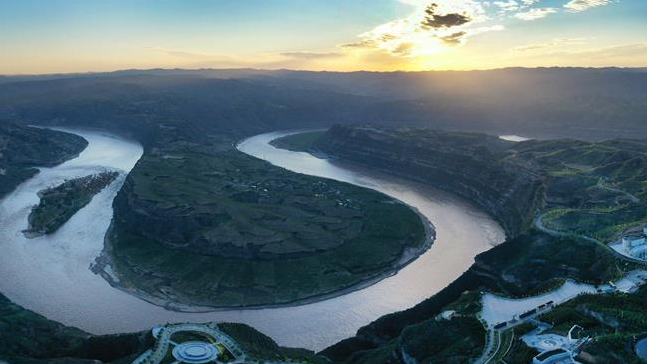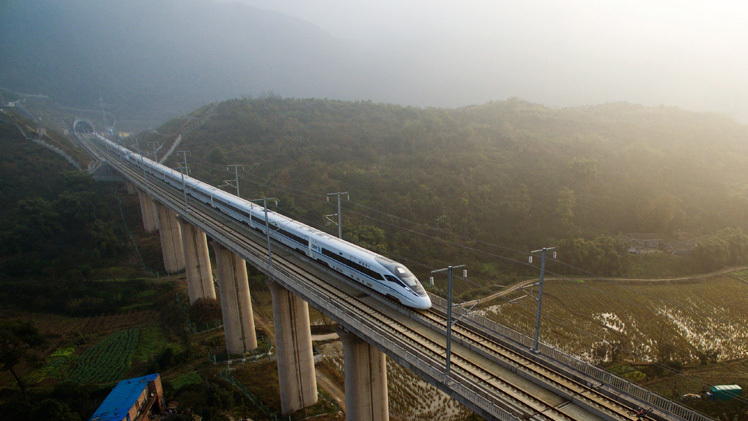Chinese President Xi Jinping, also general secretary of the Communist Party of China (CPC) Central Committee, on Friday called for concentrated efforts to enhance the ecological protection and high-quality development of the Yellow River basin, and promote the construction of an economic circle covering the southwestern cities of Chengdu and Chongqing.
Xi, also head of the Central Committee for Financial and Economic Affairs, made the remarks at the sixth meeting of the committee.

The Qiankunwan river bend along the Yellow River, China's second-longest waterway, on the border between Yanchuan County, northwest China's Shaanxi Province and Yonghe County, north China's Shanxi Province, August 14, 2019. /Xinhua Photo
The Qiankunwan river bend along the Yellow River, China's second-longest waterway, on the border between Yanchuan County, northwest China's Shaanxi Province and Yonghe County, north China's Shanxi Province, August 14, 2019. /Xinhua Photo
Hailing the Yellow River's importance as an ecological barrier, an economic zone and a cultural heritage site in China, President Xi stressed efforts to promote its ecological protection and high-quality development.
In particular, Xi said efforts should be made in strengthening water, soil, and air pollution control, improving drinking water safety, and solving water scarcity to push for the long-term sustainable development of the river basin.
Future work should focus on the efficient utilization and conservation of water resources while protecting, inheriting and promoting the Yellow River culture, which is an important part of Chinese civilization, Xi said.
Read More:
The Yellow River's vital role in China
Water control in the Yellow River improves resource utilization
Restoring the loess plateau, home to Chinese civilization
The Chinese President set the protection and development of the Yellow River as a major national strategy in mid-September, 2019, saying that "The protection of the Yellow River is critical to the great rejuvenation and sustainable development of the Chinese nation."
During the meeting, Xi also pointed out the necessity to coordinate the modernization and industrial upgrading of major city clusters along the Yellow River basin, such as the Lanzhou-Xining (Lan-Xi) urban agglomeration and cities centered around Xi'an, Zhengzhou and the Shandong Peninsula.

A bullet train runs connecting Chengdu and Chongqing in Bishan County, southwest China's Chongqing Municipality, December 26, 2015. /Xinhua Photo
A bullet train runs connecting Chengdu and Chongqing in Bishan County, southwest China's Chongqing Municipality, December 26, 2015. /Xinhua Photo
The Chengdu-Chongqing economic circle
President Xi also stressed in the meeting that pressing ahead with the Chengdu-Chongqing economic circle is instrumental in forming a crucial driver for the high-quality development of China's western region and an inland hub for the open economy.
He called for enlarging the effects of Chongqing and Chengdu as central cities and building the Chengdu-Chongqing city cluster into an important economic center, a science and technology innovation center, a new hotspot for reform and opening-up, and a high-quality livable place with nationwide influence.
The building of the Chengdu-Chongqing economic circle is a systematic project that entails top-level design and coordination, Xi said, adding it is essential to speed up building of infrastructure, transportation and modern industrial systems, so as to enhance the capacity of innovation and coordinated development.
Optimizing land and space planning while pushing forward ecological and environmental protection were also highlighted at the meeting.
Regional economic planning
At the committee's latest meeting held last August, Xi called for improving regional economic planning featuring complementary strengths and high-quality development, and upgrading industrial basic capabilities and industrial chains.
A statement released after the meeting called for strengthening the economic and population carrying capabilities of central cities and city clusters, promoting equal access to basic public services among residents, and seeking a more balanced development.
China has identified nine cities as "national central cities": Beijing, Tianjin, Shanghai, Chongqing, Guangzhou, Chengdu, Wuhan, Zhengzhou and Xi'an. These megacities are expected to drive the high-quality development of their regions and serve the entire nation.